Politics
Beijing confirms no Chinese nationals among Pakistan flood fatalities
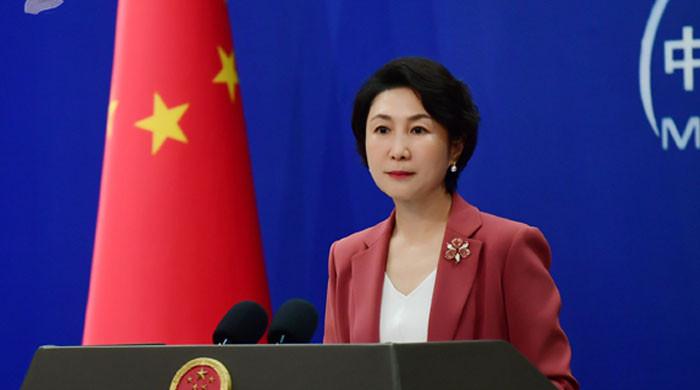
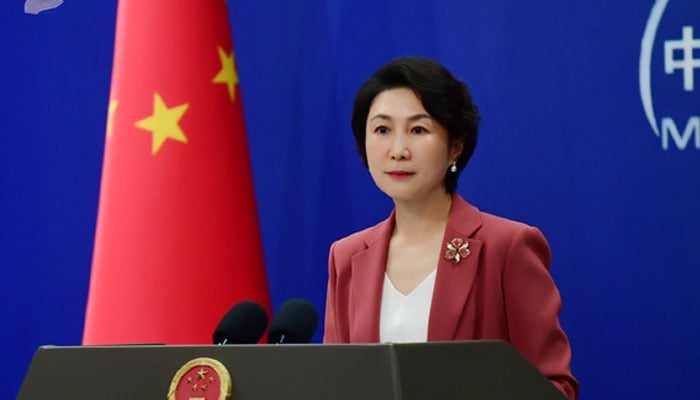
Beijing on Monday confirmed that no Chinese nationals are among those killed in the devastating flash floods across parts of Pakistan.
Speaking at a regular press briefing on Monday, Chinese Foreign Ministry Spokesperson Mao Ning said: “At present, we are not aware of any Chinese citizens having lost their lives in the disaster. Our embassy in Pakistan is still working to verify the situation.”
She expressed China’s condolences over the loss of life and destruction caused by the floods, which have claimed hundreds of lives and led to widespread displacement across multiple regions.
“We have noted the severe rainfall disasters in multiple regions, which have caused casualties and property losses. We express our deep condolences for the deceased and extend our sympathies to the bereaved families and the injured,” Ning said.
Ning added that Chinese Foreign Minister Wang Yi had also conveyed condolences to Pakistan’s Deputy Prime Minister and Foreign Minister Ishaq Dar, and reiterated China’s confidence in Pakistan’s resilience.
“We believe the Pakistani people will surely overcome the disaster and rebuild their homes,” she said.
The death toll from devastating floods triggered by heavy monsoon rains has climbed to 660 across Pakistan, with reports of casualties and widespread destruction pouring in from all provinces and regions.
Khyber Pakhtunkhwa (KP) registered the highest fatalities at 392, followed by Punjab with 164, Gilgit Baltistan (GB) with 32, Sindh with 29, Balochistan with 20, Azad Jammu and Kashmir (AJK) with 15, and Islamabad Capital Territory with 8, according to the National Disaster Management Authority (NDMA).
Among the victims, 394 were men, 95 women, and 171 children. The total number of injured has reached 935, most of them in Punjab (582), while 245 were reported in Khyber Pakhtunkhwa, 40 in Sindh, 37 in Gilgit-Baltistan, 24 in AJK, 4 in Balochistan, and 3 in Islamabad.
At least 935 people have been injured nationwide — 582 in Punjab, 245 in KP, 40 in Sindh, 37 in GB, four in Balochistan, 24 in AJK and three in ICT.
Housing losses are also widespread, with a total of 2,478 houses damaged. KP has reported 500 partially and 212 fully destroyed homes. In Sindh, 54 homes were partially and 33 fully damaged.
GB has recorded 229 partially and 368 fully destroyed houses, while in AJK 567 houses were partially and 152 completely destroyed. In ICT, 64 homes were partially damaged and one fully destroyed.
Punjab reported 215 partial and one complete destruction. In Balochistan, 69 houses were partially and 13 fully damaged, bringing the total to 82.
Politics
Five-year-old boy detained by ICE has returned to Minnesota, says lawmaker


- Liam Conejo Ramos, father escorted back to Minnesota by lawmaker.
- Federal judge had ordered their release from ICE detention in Texas.
- Democrats demand reforms after ICE operations and shootings.
Five-year-old Liam Conejo Ramos and his father have returned to their home in a Minneapolis suburb after being detained by US immigration officers and held at a detention facility in Texas, a lawmaker said on Sunday.
A federal judge on Saturday ordered the release of Adrian Conejo Arias and his son, whom immigration officers detained during a Minnesota raid.
US Representative Joaquin Castro, a Texas Democrat, wrote in a social media post that he picked them up on Saturday night at the detention facility and escorted them back to Minnesota on Sunday.
“Liam is now home. With his hat and his backpack,” Castro said. “We won’t stop until all children and families are home.”
A photo that went viral last month shows Liam wearing a blue bunny hat outside his house with federal agents standing nearby.
He was one of four students detained by immigration officials in a Minneapolis suburb, according to the Columbia Heights Public School District.
The Ecuadorean boy and his father, who entered the United States legally as asylum applicants, had been held in a detention facility in Dilley, Texas.
US District Judge Fred Biery wrote in a ruling on Saturday that the case had its genesis in “the ill-conceived and incompetently-implemented government pursuit of daily deportation quotas, apparently even if it requires traumatising children.”
Biery, appointed by former President Bill Clinton, cited the Constitution’s requirement that an arrest warrant must be based on a judge’s finding of probable cause of a crime.
“The use of ‘administrative warrants’ issued by immigration officials is called the fox guarding the henhouse,” he wrote.
Democrats have called for reforms after large-scale enforcement operations in Minnesota and other states, following two deadly shootings of US citizens in Minneapolis involving ICE agents.
Those demands by Democratic lawmakers include mandatory body cameras, the end to roving patrols and halting the use of face masks.
Funding for the Homeland Security Department has been held up as Republicans and Democrats continue negotiating over a DHS bill.
“We’ll be talking about that in the near future,” President Donald Trump told reporters on Sunday at his Mar-a-Lago club in Palm Beach, Florida.
Some Republican mayors also see a need for reforms. “We’re generally encouraged that the administration seems to be exploring that pivot,” Oklahoma City Mayor David Holt told CBS’s “Face the Nation” on Sunday.
Mayors are “caught in a little bit of an impossible situation” with federal immigration enforcers’ presence in cities, Holt said, adding events in Minneapolis threaten to erode the trust authorities have built over time with residents in cities.
Holt spoke the day after Trump ordered DHS to refrain from dealing with protesters unless federal property is threatened or local officials request help.
Politics
Global science heavyweights converge in UAE for World Laureates Summit
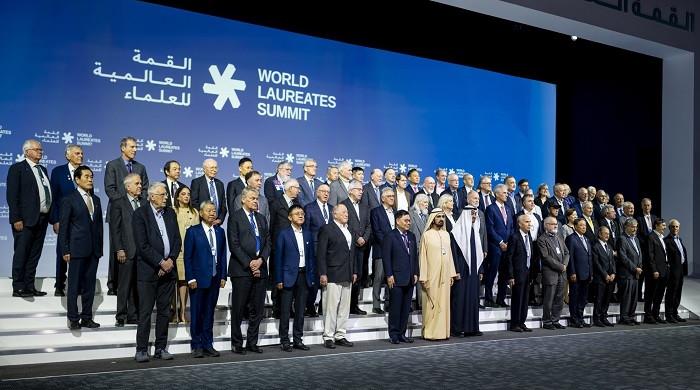
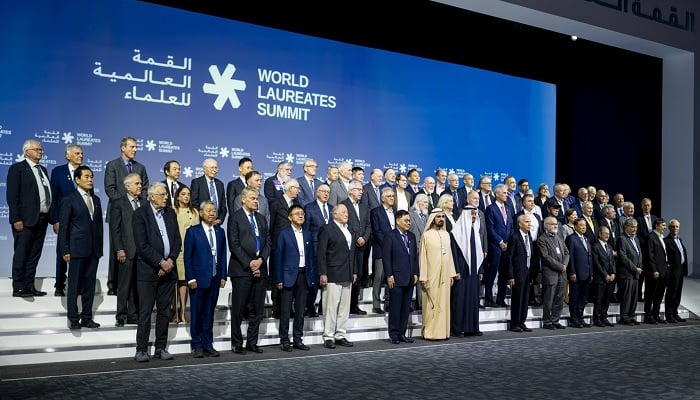
DUBAI: The United Arab Emirates on Sunday opened the World Laureates Summit, the world’s largest gathering of Nobel Prize winners, bringing leading scientists and thinkers to Abu Dhabi to discuss some of the most pressing global challenges.
The summit brings together more than 150 Nobel laureates, scientists and policymakers from around the world to exchange ideas on issues ranging from climate change and health to technology, education and sustainable development, highlighting the UAE’s growing role as a hub for global scientific dialogue.
The three-day summit runs alongside the World Governments Summit 2026. It was inaugurated by UAE President Sheikh Mohamed bin Zayed and UAE Vice-President, Prime Minister and Dubai ruler Sheikh Mohammed bin Rashid Al Maktoum.
Discussions focus on artificial intelligence, quantum science, nanotechnology, biotechnology, and energy.
Experts say fundamental science is key to shaping global policy and sustainable development.
Sheikh Mohamed bin Zayed said scientists were “essential partners in building the future.” Sheikh Mohammed called science “the true wealth of nations.”
The World Laureates Association also announced a new UAE base. Organisers said it will turn the country into a hub for international research collaboration.
The summit aims to link scientific innovation directly to policy decisions. It highlights the UAE’s growing role as a global platform for knowledge and technology.
Politics
Trump hopeful of Iran deal after Tehran warns of regional war
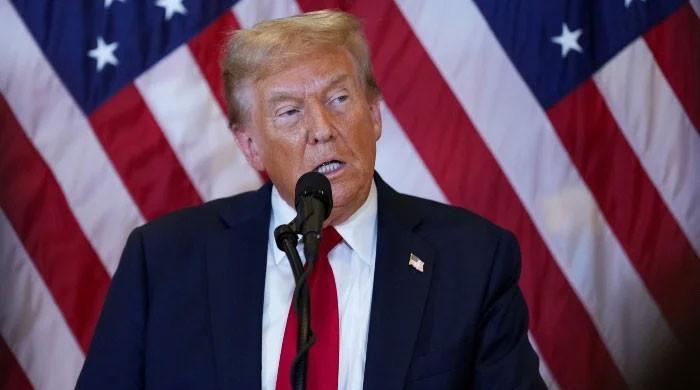
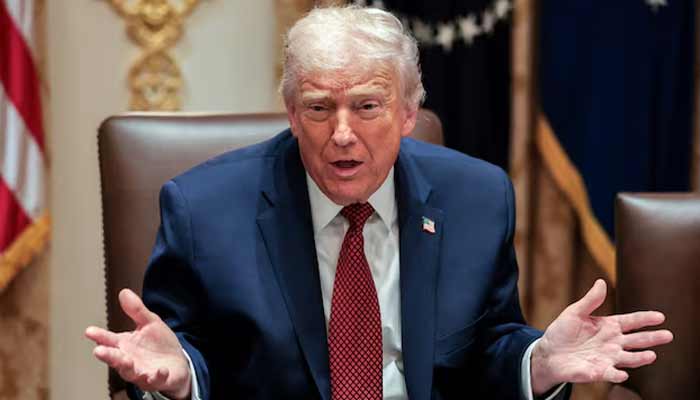
- Trump says deal possible as Iran warns of regional war.
- Khamenei warns US attack would trigger regional conflict.
- Iran frees protester on bail amid rising US tensions.
US President Donald Trump on on Sunday said he was hopeful of agreeing a deal with Iran after the country’s supreme leader warned that any US attack on the Islamic republic would trigger a regional war.
Following the Iranian authorities’ deadly response to anti-government protests that peaked last month, Trump has threatened military action and ordered the dispatch of an aircraft carrier group to the Middle East.
Iranian supreme leader Ayatollah Ali Khamenei on Sunday likened the recent protests to a “coup”, warning that a US attack would trigger a broad conflict.
“The Americans should know that if they start a war, this time it will be a regional war,” he said, telling Iranians they “should not be scared” of Trump’s rhetoric.
“They (rioters) attacked the police, government centres, IRGC centres, banks, and mosques, and burned the Koran[…] It was like a coup,” Khamenei said, adding that “the coup was suppressed”.
Asked about the Iranian leader’s warning, Trump told reporters on Sunday: “Of course he is going to say that.
“Hopefully we’ll make a deal. If we don’t make a deal, then we’ll find out whether or not he was right,” he said.
Iranian authorities nonetheless ordered the release of detained 26-year-old protester Erfan Soltani on bail, his lawyer said on Sunday, after Washington warned he was on death row and threatened an attack if any anti-government demonstrators were executed.
He was arrested in January for what Iran’s judiciary said were charges of propaganda against Iran’s Islamic system and acting against national security.
Washington had warned he was due to be executed, though Tehran said he had never been sentenced to death and that the charges against him did not carry the death penalty.
As tensions heightened between Iran and the US, Tehran’s Foreign Minister Abbas Araghchi on Sunday said he was concerned about “miscalculations” but said he believed Trump was “wise enough to make the correct decision”.
He said Iran has lost trust in the United States as a negotiating partner, adding that some countries in the region were acting as intermediaries to rebuild trust.
“So I see the possibility of another talk if the US negotiation team follows what President Trump said: to come to a fair and equitable deal to ensure that there is no nuclear weapons,” he said in an interview with CNN.
‘Terrorist’ designations
Tehran has acknowledged thousands of deaths during the protests, and on Sunday the presidency published a list of 2,986 names out of the 3,117 that authorities said were killed in the unrest.
Of the total, 131 have yet to be identified but their details will be released soon, it said in a statement.
Authorities insist most were members of the security forces and innocent bystanders, attributing the violence to “terrorist acts”.
However, the US-based Human Rights Activists News Agency (HRANA) said it has confirmed 6,713 deaths, mostly protesters.
The response prompted the European Union to list the Islamic Revolutionary Guard Corps (IRGC) as a terrorist organisation, with Iranian lawmakers retaliating on Sunday by slapping the same designation on European armies.
Lawmakers wore the green uniform of the Guards in a display of solidarity at the legislative session, where they chanted “Death to America”, “Death to Israel” and “Shame on you, Europe”, state television footage showed.
It remained unclear what immediate impact the decision would have.
The step matched similar classifications enacted by the United States, Canada and Australia.
Threats and dialogue
Firouzeh, a 43-year-old homemaker who declined to give her full name, said the recent tensions had left her “very worried and scared”.
“Lately, all I do is watch the news until I fall asleep. Sometimes I wake up in the middle of the night to check the updates,” she said.
IRGC official Ahmad Vahidi was quoted by the Mehr news agency as saying “enemies” sought to create a “war atmosphere”.
But Ali Larijani, head of Iran’s Supreme National Security Council, said on Saturday: “Contrary to the hype of the contrived media war, structural arrangements for negotiations are progressing.”
Trump also confirmed that dialogue was taking place, but without withdrawing his earlier threats, adding “we’ll see what happens”.
The US president previously said he believed Iran would make a deal over its nuclear and missile programmes rather than face military action.
Tehran, meanwhile, has said it is ready for nuclear talks if its missile and defence capabilities are not on the agenda.
-

 Sports5 days ago
Sports5 days agoPSL 11: Local players’ category renewals unveiled ahead of auction
-

 Entertainment5 days ago
Entertainment5 days agoClaire Danes reveals how she reacted to pregnancy at 44
-

 Fashion1 week ago
Fashion1 week agoSpain’s apparel imports up 7.10% in Jan-Oct as sourcing realigns
-

 Sports5 days ago
Sports5 days agoCollege football’s top 100 games of the 2025 season
-

 Business6 days ago
Business6 days agoBanking services disrupted as bank employees go on nationwide strike demanding five-day work week
-

 Tech1 week ago
Tech1 week agoICE Asks Companies About ‘Ad Tech and Big Data’ Tools It Could Use in Investigations
-

 Fashion1 week ago
Fashion1 week agoAustralian wool prices climb again as exporters drive demand
-

 Politics5 days ago
Politics5 days agoTrump vows to ‘de-escalate’ after Minneapolis shootings






